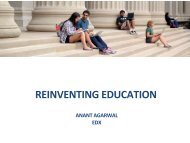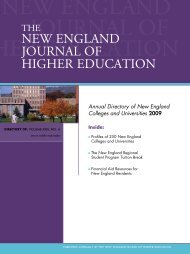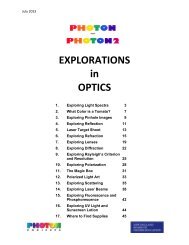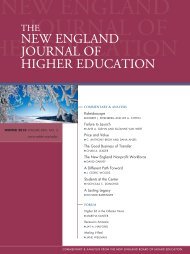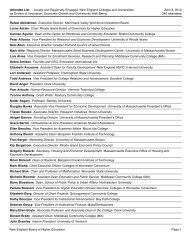Edward R. Terceiro, Jr. - New England Board of Higher Education
Edward R. Terceiro, Jr. - New England Board of Higher Education
Edward R. Terceiro, Jr. - New England Board of Higher Education
- No tags were found...
Create successful ePaper yourself
Turn your PDF publications into a flip-book with our unique Google optimized e-Paper software.
There is no one clear cut solution to carbonneutrality – every campus presents its ownchallenges and possibilities. How do you balance operationalconsiderations with your approach to carbonneutrality i.e. demand side management? What are some <strong>of</strong> the funding optionsavailable? What are the potential CurriculumImplications?
The rising and disproportionate costs <strong>of</strong>energy in the Northeast The Nation’s continued dependence onforeign oil & its impact on national security The obligation to address the need forincreased energy production in consort withenvironmental protection The need to keep student costs as low aspossible
287acre site located in a snowbelt at the highest elevation innorth-central Massachusetts 450,000 s.f. <strong>of</strong> classrooms,laboratories, library, theater,gymnasium, etc. The College utilized electricityas its sole source <strong>of</strong> climatecontrol Enrollment 9,000 day &evening students
Biomass Conversion Biomass Gasification – Combine Heat &Power Photovoltaics – 100kW Solar Thermal –Domestic Hot Water Energy Conservation Measures (ECMs) Geothermal (Veteran’s Rehabilitation Center) Plug in Hybrid Wind Turbines
Conversion <strong>of</strong> all electric campus toto a Closed Loop Hydronic BiomassSystemInstallation includes a 320 bhpwood chip boiler with 300 bhp oilfired backupComputer controlledfacility
Converted an all-electric facility to a closedloopbiomass fueled hydronic system Installed energy efficient lighting Installed variable frequency drives andpremium efficiency motors Replaced all unit ventilators Installed a domestic hot water heatexchanger Implemented domestic water conservation(low GPF toilets/low GPM sinks) Installed a consolidated compressor farm Expanded the central chilled water system forcooling
The energy savings accomplished by thisproject provide a significant environmentaland health benefit from the reduction <strong>of</strong> airpollutants and greenhouse gas emissions.For example, we have reduced CO 2emissions by 14,890 tons, NO x by 24.2 tons,and SO x by 64 tons. This reductions would be equivalent toplanting 4,079 acres <strong>of</strong> trees and removing2,601 automobiles from the roads.
Electricity: 4,046,874 (kWh)( 45.97% reduction, enough to serveapproximately 1200 residential allelectriccustomers per year)Water: 2,222,222 gals ( 52.52% reduction)CO 2 reduction: 24%
Sustainability is developmentthat meets today’s needswithout compromising theability <strong>of</strong> future generations tomeet their own needs.By incorporating biomass, theCollege is utilizing a fuelsource that is renewable,locally available, costeffective, environmentallyfriendly and publiclyacceptable.
Energy Savings 2002- 2009Total Total Gals Total TotalSaved Saved Saved <strong>of</strong> Water Dollar Dollar SavingsYear kWh Peak kWh <strong>of</strong>f-peak kWh Saved Savings Current Rate2002 1,986,158 902,413 2,888,571 2,222,222 $ 198,923 $ 198,9232003 2,575,626 1,208,478 3,784,104 2,222,222 $ 272,826 $ 314,6002004 3,117,068 1,623,557 4,740,625 2,222,222 $ 313,839 $ 402,6382005 2,966,760 1,523,351 4,490,111 2,222,222 $ 304,586 $ 462,2142006 2,871,270 1,459,691 4,330,961 2,222,222 $ 294,570 $ 605,6152007 3,326,612 1,769,135 5,095,747 2,222,222 $ 335,310 $ 682,5642008 3,022,039 1,560,204 4,582,243 2,222,222 $ 313,965 $ 556,3702009 3,052,190 1,586,187 4,638,377 2,222,222 $ 307,053 $ 606,51022,917,723 11,633,016 34,550,739 17,777,776 $2,341,072 $ 3,829,434
Installation <strong>of</strong> a 50 kW gasifierand co-gen setThe downdraft gasificationtechnology employed producesthe lowest emissions <strong>of</strong> tars andcomplex hydrocarbons <strong>of</strong> anyknown wood combustiontechnology
BioMax: Gasification Converts Woody Materialsto a Clean Fuel Gas forHeat, Power and CoolingWood Chips,Wood Pellets,Nut Shells, Etc.20% CO18% H 22% CH 4+ CO 2, H 2 OStart-up FuelPropane,Natural Gas, Etc.SolidGasFeederDryerBioMaxGasifier& N 2 HEAT HEATGasCoolingCleaningPowerGenElectricity*(Loads)Wood Energy Conversion Efficiency: 80%System CH&P Efficiency = +70%* and/or shaft power
The College has recentlyinstalled a 100 kWPhotovoltaic array.Funding included the use<strong>of</strong> a Clean RenewableEnergy Bond (CREB) aswell as funding from theMassachusettsTechnology Collaborative.
MWCC has installed asolar thermal arraythat will providedomestic hot water tothe main building.The college is alsoexploring thefeasibility <strong>of</strong> a similarinstallation at thegym.
MWCC received agrant from theDivision <strong>of</strong> EnergyResources toconvert its hybridvehicle to a plug inversion which willnow get as much as100 mpg.
MWCC has been awarded$3,000,000 from the U.S.Department <strong>of</strong> Energy ( Energyand Water DevelopmentAppropriation Bill) to install two1.65 MW wind turbines and towork with surroundingcommunities to developimplementation strategies for theinstallation <strong>of</strong> turbines across thestate’s northern tier.
High Efficiency Heat Pumps,Economizer DCV for selected spaces Baseboard Controls Lighting & Lighting Controls Kitchen Hood Controls Occupancy Based Controls Pool Filter & Pool Cover Solar Domestic Hot Water
Total Proposed Costs: $796,620 Electrical Incentives: $230,667 Annual kWh savings: 846172kWh (14.5% <strong>of</strong>current energy consumption) Total annual savings $129,113 Simple payback: 4.3 years
U.S Department <strong>of</strong> Energy Mass Technology Collaborative & RenewableEnergy Trust Funds Utility Rebates Clean Renewable Energy Bonds (CREBs) Renewable Energy Credits Clean Energy Investment Program - GeneralObligation Bonds Performance Contracting
Performance contracting is a unique andextremely effective approach to installinginnovative energy efficiency and infrastructureimprovements by leveraging the currentoperating budget. Investments are self-funding, paid for overtime from the guaranteed energy savingsdelivered.
Project Costs are Paid from Existing Budgets
“By addressing the College’s responsibility tominimize its own contributions to globalwarming and by emphasizing the importance<strong>of</strong> making the transition to a low carbon,sustainable economy, the College hasdefined a new mission for the school; one thatcreates educational and pr<strong>of</strong>essionalopportunities for students, supports thepr<strong>of</strong>essional development <strong>of</strong> faculty and staffwhile also encouraging a sustainable quality<strong>of</strong> life for residents in our service deliveryarea.”
“Heading Toward Zero: Climate Action at theMount represents a collaboration <strong>of</strong> multiplestakeholders including MWCC faculty, staff,students, alumni, industry partners, businessowners, government <strong>of</strong>ficials and othercommunity members. It promotes thedevelopment <strong>of</strong> education tools, researchopportunities and institutional supportrequired to generate solutions for thechallenges <strong>of</strong> global climate change within thecontext <strong>of</strong> the college.”
Commuter Transportation Initiative Integrate Sustainability Within StrategicPlanning Process Deploy Energy Efficiency Awareness &Behavior Campaigns (ABCs) “Living Machine” Research Stormwater Management Community Gardens, Composting Program,Kitchen Garden City <strong>of</strong> Gardner Energy Audit Pilot
In December (2009) the MassachusettsDepartment <strong>of</strong> <strong>Higher</strong> <strong>Education</strong> approvedMWCC’s proposal for a Certificate Program andan Associate <strong>of</strong> Science Degree in EnergyManagement. The degree in Energy Management is the onlyknown program <strong>of</strong> its kind within theMassachusetts Community College system orwithin any community college located along theentire east coast.
“ For the past decade, MWCC has beenrecognized for its institutional successes inrenewable energy and conservation. Theseenergy initiatives will now serve as a learninglaboratory to enhance the academicexperience for emerging pr<strong>of</strong>essionals in anew clean energy economy.”Daniel M. Asquino, President MWCC
Ed <strong>Terceiro</strong>, Resident Engineer, MountWachusett Community College(978-630-9103) eterceiro@mwcc.mass.edu


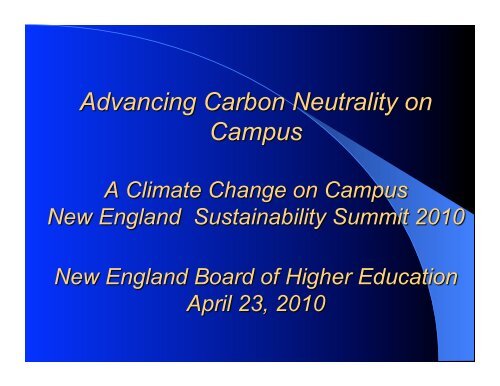
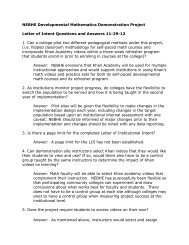
![2011 Excellence Awards Sponsorship Opps-3[1] - New England ...](https://img.yumpu.com/51305689/1/190x245/2011-excellence-awards-sponsorship-opps-31-new-england-.jpg?quality=85)

